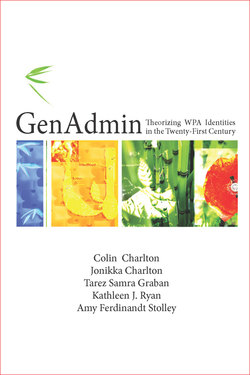GenAdmin

Реклама. ООО «ЛитРес», ИНН: 7719571260.
Оглавление
Colin Charlton. GenAdmin
Отрывок из книги
Writing Program Administration
Series Editors: Susan H. McLeod and Margot Soven
.....
A reading of the essays in Theresa Enos and Shane Borrowman’s The Promise and Perils of Writing Program Administration causes us to reconsider the belief that writing program administration is a discipline built on solid ground. This collection offers survey data about WPAs and their living/working conditions and situates WPAs as caught between tensions related to a disrespect of our disciplinarity and jobs that entail large responsibilities but little authority, largely because of the number of untenured WPAs. An important argument Skeffington, Borrowman, and Enos make is that writing program administrators need to extend their understanding of the legitimacy of writing program administration beyond their sphere or work: “we have convinced ourselves that writing program administration is legitimate, important, and theoretical work. We now need to convince faculty members in our departments, colleges, and across campus” (“Living” 19). The tensions that WPAs negotiate, they argue, are often the source of much peril, but also create the possibility for much promise. Debra Frank Dew and Alice Horning’s recent collection, Untenured Faculty as Writing Program Administrators: Institutional Practices and Politics, more fully explores the ethics and politics of jWPA positions, a discussion close to our hearts and minds as we all hold or have held WPA positions as graduate students and as pre-tenure faculty. This collection begins to re-landscape writing program administration in significant ways, and our work responds to their concerns, for we go further to disrupt accepted WPA narratives and frameworks that claim that jWPAs should not ever take on WPA jobs, a stance that the five of us find to be practically untenable and philosophically limiting given the many complications related to job choice.
Virginia Anderson and Susan Romano’s collection, Culture Shock and the Practice of Profession: Training the Next Wave in Rhetoric and Composition, turns a critical lens on the position of WPA by examining how the decisions WPAs make and the philosophies they enact as WPAs, combined with the changing issues of disciplinarity and professionalization happening in the field, challenge rhetoric and composition graduates’ identity development, practices, and beliefs about graduate student preparation. As a whole, the book critiques “luck-of-the-draw, true-grit” professional narratives in favor of rhetorical understanding (2). In their introduction, Anderson and Romano characterize the essays in this collection as “ask[ing] implicitly and explicitly for preparation in rhetorica utens, in the arts of deploying disciplinary knowledge and the skills of establishing relationships and ethos, from programs that have listened to and acted on news from the field” (3). We likewise use critique to construct new thinking about our profession. In this book, we build not only on “news from the field” to develop our arguments, but also on our collective (though disparate) experiences as WPAs in order to establish GenAdmin as an identity that includes, among other things, rhetorica utens and the notion that taking on shifting identities rather than seeking a fixed positioning is not only strategic (Anderson and Romano 3) but also a part of how we understand and experience identity.
.....